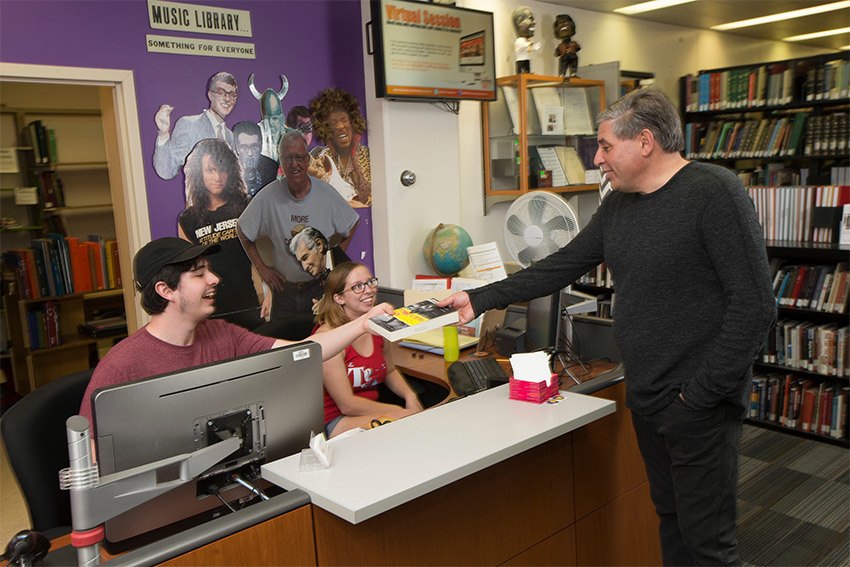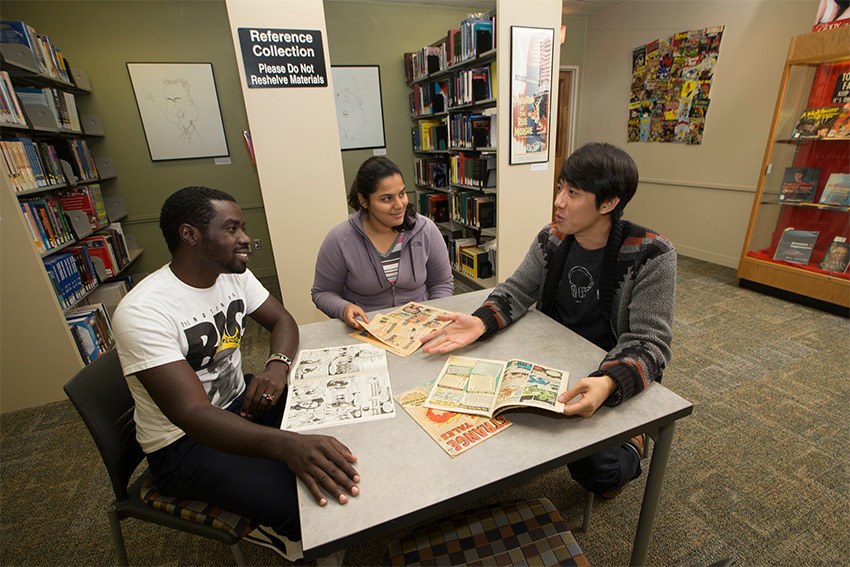Nationally recognized for student experience
The Wall Street Journal

Bachelor of Arts (B.A.)
Minor
Popular Culture
The BGSU popular culture major educates students in ways to study the forms of creative expression we consume in everyday life.
By considering popular materials, students confront issues concerning the relationships of commerce to art, the popular media to society, and the effects of widespread use of the mass media.
Students will explore the impact popular culture (such as television, movies, music, popular books and magazines, sports, holidays, festivals, dance and folklore) has on our culture and how it reflects and impacts the values of our society.
A rigorous framework for analysis is established that allows students to research and present enquiry into areas of their interest in a major capstone project.
Skills in critical thinking, writing, communication and research make graduates popular for jobs in museums, journalism and NGO management roles.
A history of innovation
The Department of Popular Culture was created in 1973 and asked students to consider cultural forms that they were familiar with in their everyday lives but had not reflected upon critically.
The BGSU Department of Popular Culture was started by Dr. Ray Browne, who also founded The Journal of Popular Culture in 1967, and in 1969, the scholarly association for the study of popular culture, the Popular Culture Association, now headquartered at Michigan State University.
Since its inception, the Department of Popular Culture at Bowling Green State University has been a leader in the scholarly movement to investigate popular culture.
The popular culture major is an individually designed and planned program that allows students to develop specializations in specific areas of the students choosing.
While studies of contemporary culture are an essential part of the program, historical material is also emphasized. Students learn cultural studies theories and research methods used to analyze popular culture and its impact on society. Areas studied include popular music, television, film and folklore.
Previous research areas of faculty and students include: new action heroines in popular culture, video game preservation issues and critical pedagogy, and black popular genres.
Bowling Green State University is the only institution in the nation to have a Department of Popular Culture.
#1 public university in Ohio for career prep
The Wall Street Journal
Career - what can you do with a pop culture degree?
Training in popular culture can prepare students for many careers. BGSU popular culture graduates work in media firms, the music industry, radio and television stations, public relations, and the non-profit sector. They are consultants in a variety of fields, educators, and business professionals.
The skills learned through the popular culture major, such as analysis, research, critical thinking through different perspectives, and communication, are in demand by today’s employers.
Career paths
- Popular Culture Critic
- Arts Reviewer
- Television Executive
- Magazine Editor
- Public Relations Specialist
- Museum Curator
- Journalist
- Author
- Arts Administrator
Quick Facts from the Bureau of Labor Statistics
Curriculum
Popular culture students complete a core of courses including media and research methods and a folklore course. Electives allow students to use their skills to develop insight into a chosen area of study.
Popular culture courses examine those aspects of national and international culture which have the most impact on a majority of the population. The field includes the study of television, popular music, popular literature such as magazines and best sellers, sports, amusement parks, and movies.
Students examine how and why people select their entertainment, what such things as television programs and movies mean to those who watch them, how popular products are marketed, and how all aspects of our daily lives influence our basic beliefs and values.
As part of the School of Cultural and Critical Studies (CCS), all popular culture majors take a rigorous core curriculum in their junior and senior years that consists of a theory course (CCS 3030: Intersections of Gender, Race & Culture), a service-learning course (CCS 3710 Gender, Race & Culture in Community-Based Practice), a research methods course (CCS 4850: Qualitative Research Methods), and a writing course (CCS 4860: Capstone Seminar).
Taking the courses with other majors across CCS helps students develop a stronger sense of community and interdisciplinary connection. Popular culture minors are welcome to take these courses as well.
BGSU popular culture students will learn research methods and cultural studies theories, create their own capstone research project and engage in service learning. Students are encouraged to explore study abroad, research and internship opportunities.

Sample courses
- Introduction to Pop Culture
- Intersections of Gender, Race & Culture
- Global Popular Culture
- Introduction to Contemporary Popular Literature
- Television as Popular Culture
- Black Popular Culture
- Advanced Studies in Popular Film
- Contexts of Popular Music
The Browne Popular Culture Library at BGSU is the most comprehensive archive of its kind in the United States.
#1 university in Ohio – big or small, public or private – students would choose again
The Wall Street Journal
Ray & Pat Browne Library for Popular Culture Studies
The Browne Popular Culture Library (BPCL), founded in 1969, is the most comprehensive archive of its kind in the United States. Our mission is to acquire and preserve research materials on American Popular Culture (post-1876) for curricular and research use.
Our collection strengths include research materials on popular fiction, popular entertainment and the graphic arts. As an archive, our collection does not circulate, except our DVD collection. A large part of our collection is searchable via the library catalog, and we maintain research guides and finding aids for browsing the remainder of the collection.
Music Library & Bill Schurk Sound Archives
With almost a million recordings, the Music Library & Bill Schurk Sound Archives is the largest collection of popular music in an academic library in North America. Our recordings include 45s, 78s, 33s, LPs, reel-to-reel tapes, cassette tapes and CDs.
The sound recording collection is supported by books, scores, video/film, hard-to-find periodicals, fanzines, promotional materials and archival collections.
Popular Culture Scholars' Association
The Popular Culture Scholars' Association (PCSA) encourages the study of popular culture among the greater BGSU community, supports the professional development of students pursuing a M.A. in popular culture at BGSU, and links undergraduates, graduates, educators and outside scholars in conversation.
The PCSA hosts professional development programming and an annual Ray Browne Popular Culture Conference. We welcome all who love popular culture and wish to learn more about its value within our society and how we engage with it daily.
The Popular Culture program is a part of the Department of Popular Culture in the School of Cultural & Critical Studies and the College of Arts and Sciences.
Request Information
Accreditation
Bowling Green State University [BGSU] is accredited by the Higher Learning Commission. BGSU has been accredited by the Higher Learning Commission since 01/01/1916. The most recent reaffirmation of accreditation was received in 2022-2023, with our next reaffirmation of accreditation scheduled for 2032-2033. Questions should be directed to the Office of Institutional Effectiveness.
Updated: 12/04/2025 02:09PM

